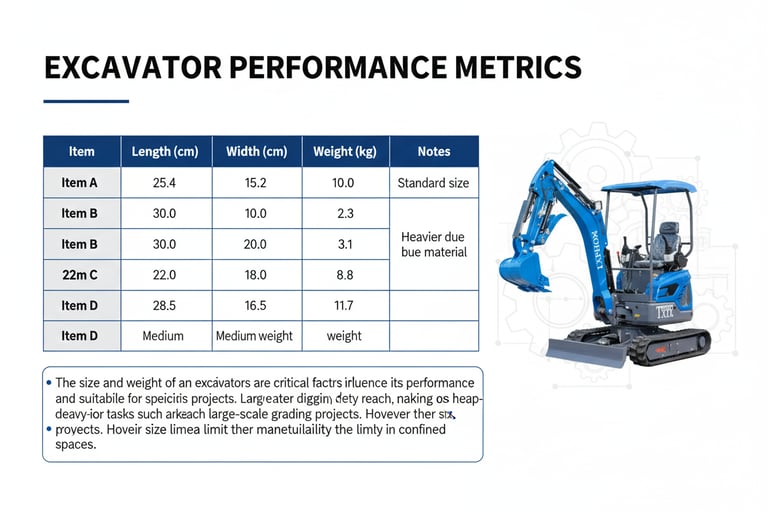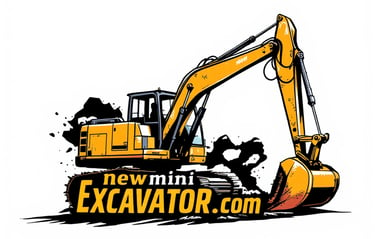How to Choose the Best 1 Ton Excavator for Construction
Learn how to pick the most suitable 1 ton excavator for your construction project. Compare features, performance, budget, and job requirements to make the right choice.
1 TON EXCAVATOR
11/20/20256 min read
How to Pick the Most Suitable 1 Ton Excavator for Your Construction Project
The first thing you should do when planning a construction project is to figure out what exactly you need. This means looking over thoroughly what work you need to do, like digging, grading, or demolishing.
These are different types of work that mean the different functionalities of the excavator should be required to do them, and by knowing these, you will be guided to the right machine.
For example, if a lot of earthmoving is the core of your idea, a bigger excavator with a more powerful engine and a stronger hydraulic system would be the one to choose. On the other hand, a small project or a confined area where no one can move may require only a compact excavator.
Besides, the extent of your work and its size are also matters to be taken into consideration. Are you working on a residential site, a commercial development, or perhaps a large infrastructure project? The type of the project you are dealing with defines the nature of work its equipment needs to be suited to.
For instance, urban construction sites often mean the issues of small areas and noise limitations, which can force you to use smaller and quieter machines. Knowing these will assist in not only selecting the right excavator but also aligning it to maximize the output and efficiency during the whole project.
Key Takeaways
Define well the necessity of your construction project before deciding on the equipment.
Analyze the conditions at the site to make certain the excavator will be able to handle the terrain and the complexity of the job.
Hang up the priorities of power, performance, and size to be in line with the extent and scale of your tasks.
Fuel efficiency and maintenance should be thought over if you want to optimize your operating costs in the long run.
Expert advice will make your decisions easier and help you pick the right excavator that meets your needs.
Evaluating the Site Conditions
The site conditions are essential factors influence in decision the type of excavator that will work well for your project. You have to carefully consider the factors such as soil type, terrain, and accessibility.
For example, if it happens that you operate on the rocky or uneven ground, you may have to use an excavator with sophisticated device like rock buckets or hydraulic hammers to liberate the difficult situation.
In comparison, if your site is made of soft soil or clay, just a normal bucket will do it. Besides that, the site's accessibility can also substantially influence your selection of the necessary tool.
When the area for construction is restricted or has tight paths, you will have to use a small excavator to move around without damaging the buildings or landscapes that are close by.
On top of that, knowing the weather conditions that occur at a particular time can also determine where you will put your money; as an illustration, wet periods may call for vehicles that are equipped with extra grips and are stable, hence, they will not slip or fall over.
Thoroughly assessing these site conditions will let you be certain that the excavator you pick is the right one to face the difficulties posed by your particular environment.
Considering the Power and Performance
One of the most important aspects of an excavator that should be focused on is the power and the performance of the machine.
They are also the major reasons why it can be reliable while working on a building project, fast and energy-saving. Along with this, power and torque of the engine in particular are some of the most important signs that show whether this or that one can lift or dig a certain amount of the toughest material efficiently and rapidly.
Well, as a rule, a tool with robust power will in general bring about better work in terms of speed and output, especially while facing very tough or large material.
Just Hydrogen can make the machine work faster and better than any cross-sectional action if in the same way, the vacuum pump work, it makes it with less fuel and weight loading. For drilling the main operation unit in the machine must use hydraulic fluid
Besides engine power, it is also crucial to consider the excavator's hydraulic performance of hydraulics. The movement of it, in this case, is at the main boom, arm, and bucket, so improvements are done using the hydraulic system that does its job quietly in the background.
That's why its total or partial efficiency can massively raise or decrease the overall work. Upgrade by changing to a loaded-sensing oil hydraulics is one of the best ways flow rate adjustment is done by load sensing which improves performance and lowers energy and fuel consumption.
This is essentially what keeps the unit able to do a variety of tasks without sacrificing speed or efficiency guarantees the combination of power and hydraulic efficiency.
Examining the Size and Weight
Therefore, it is essential to strike a balance between size and functionality based on your project requirements. Weight is another important consideration, particularly in relation to ground pressure and stability. Heavier machines may exert more pressure on the ground, which can be problematic in soft or unstable soil conditions.
Conversely, lighter excavators may be more suitable for delicate environments where minimizing ground disturbance is crucial.
Additionally, understanding transportability is vital; larger machines may require special permits for transport, while smaller models can often be moved more easily between job sites.
By carefully examining these size and weight factors, you can select an excavator that aligns with both your operational needs and site constraints.
Comparing Fuel Efficiency and Operating Costs
Choosing an excavator means fuel efficiency should be among the main considerations because the operating costs will be directly affected by it.
Often, one can find that an excavator with a single advanced technology engine will have better fuel economy while not sacrificing power or performance.
Besides fuel efficiency, it is very important to consider also the operating costs that go along with owning and using an excavator.
Part of that includes maintenance expenses, insurance costs, and the loss of time that may result from the machine being down due to repairs or servicing.
Some manufacturers provide long-term warranties or service packages which eventually becomes a cost-saving measure for customers.
Moreover, it is equally important to assess resale value. Machines that keep their value better can be a better source of profit when it is time to upgrade or replace equipment. You can create a budget that fits your financial situation by comparing fuel efficiency against total operating costs.
Assessing the Maintenance and Service Requirements
Maintenance is basically the lifeline of the excavator and if neglected, the performance and the lifespan of the machine will go down drastically.
A thorough understanding of the maintenance requirements of different models will enable you to select a model that matches your operational capabilities and budget.
Some excavators have been engineered to be hassle-free during maintenance; for example, models with centralized grease points make servicing faster and thus less downtime is experienced.
Everyday maintenance works that have to be done are oil changes, the replacement of filters, and checking of the hydraulic systems and tracks.
Besides these, it is also important to factor in the spare parts availability and service support from manufacturers or local dealers. Generally, equipment made by well-known brands tend to have easier access to spare parts and also have technicians trained on them who can do the repairs quickly.
On top of that, certain manufacturers provide the telematics systems as a part of their equipment package that has the ability of sending in real time the machine's condition and performance metrics to facilitate the route for the preventive maintenance plan.
By taking into account these service and maintenance requirements beforehand, you assure yourself that throughout the lifetime of your excavator, it will be in good working order.
Seeking Expert Advice and Recommendations
The task of selecting the appropriate excavator can be complicated and therefore, the input of an expert is a priceless help for any decision-making process that is well-informed. Industry professionals such as equipment dealers or rental companies have a wide knowledge of the product and performance of different models in various situations.
They are able to provide the most effective information about which machines are suitable for a certain task based on their experiences with similar projects.
Moreover, talking to peers who are also in the construction industry, is a good source of practical advice coming from the direct use of different excavators.
Also, participation in online discussion groups as well as reading industry journals can serve as rich information sources for learning about the latest technologies and trends in excavator design.
Talking to experts helps you not only to understand better the different options that you have, but also to be sure of your final decision by confirming that it agrees with the standards and best practices of the industry.
Utilizing the help of experts and their recommendations you make the right decision that will result in project success and therefore, your investment in the equipment will be optimized.


Explore our wide range of mini excavators for sale.
Company
© 2024. New Digger for sale, All rights reserved.


Privacy Policy | Terms and Conditions
Follow us now
Support
For Inquiries
2522 S Malt Ave. Commerce, CA 90040
United States
Our Location
Tel:
+1-213214 2203
WhatsAp:
+1-3235325703
Mon-Fri: 9am-5pm
